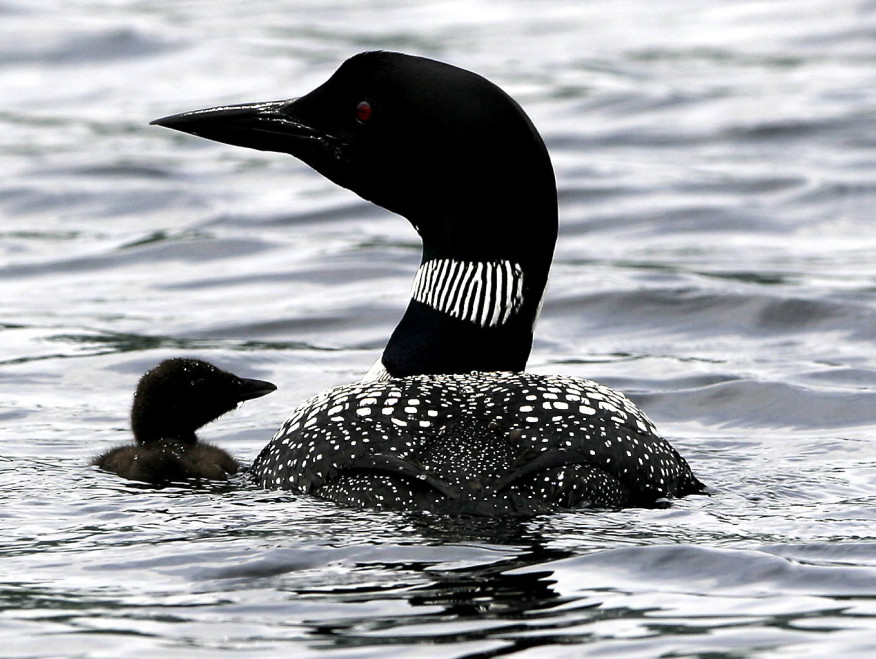Researchers are worried about the effects of global warming after a loon in Umbagog Lake tested positive for avian malaria.
The loon was found last summer in the lake, which straddles northern Maine and New Hampshire. Necropsy showed that the bird died of avian malaria – the first confirmed case of the disease among loons in either state.
The finding was a wake-up call, according to Mark Pokras, a retired Tufts University professor who specialized in loon research for 35 years and now works as a wildlife consultant based in Maine.
“One of the things we know about malaria parasites is that they are moving north,” he said. “We see other tropical and southern disease, like Lyme disease, move up here.”
Pokras said the vector-borne disease – one caused by the bite of an insect, such as a mosquito – is not a threat to humans, but the finding raises concerns about the welfare of loons in northern New England. Maine has an estimated 4,100 adult common loons during the spring and summer and New Hampshire has 500. In the fall, the birds typically migrate from their nesting spots on inland lakes to the northern Atlantic coast.
“This parasite was not here 20 years ago,” Pokras said. “We’ve been studying loons for a long time. So this problem has arrived recently.”
Maine Audubon loon specialist Susan Gallo, who runs the state’s annual loon count, echoed his concern.
“I think what is interesting about it is we didn’t see it here 25 years ago. It’s a really big question for the future,” Gallo said. “It’s a good teaching tool to illustrate the impact of climate change and the changes in vector-borne disease.”
Malaria has been found in songbirds, Gallo said, but this is the first evidence of it in loons in New England.
Pokras said it’s difficult to detect avian malaria, because the parasite can only be found in birds that have died recently. He said biologists at the Umbagog National Wildlife Refuge acted quickly and brought the loon to a wildlife pathologist at the University of New Hampshire, who found malaria in its body tissue.
Michelle Kneeland, director of the wildlife health program at the Biodiversity Research Institute in Gorham, hopes to learn more about avian malaria in the coming years through a new study, which tests the blood of live loons.
“We are currently conducting a large-scale study on adult loons, sampling a ton of live loons from across the country,” she said.
The three-year study sampled 100 live loons from across the country in 2014, another 100 in 2015 and 100 this year, Kneeland said. The preliminary results are not expected until later this year, she said, but it will be the first study shedding light on the prevalence of the disease.
Maine bird biologist Danielle D’Auria at the Maine Department of Inland Fisheries and Wildlife said she is not concerned about the disease in loons, given there has been just one confirmed case.
D’Auria recently attended the Northeast Loon Study Working Group at the Loon Preservation Committee in Moultonborough, New Hampshire, and the Umbagog loon was mentioned, but not a topic of discussion.
“It’s definitely an interesting finding in the sense it could be something more prevalent that we haven’t been aware of. It could be affecting our loons. I don’t think it’s necessarily a concern,” D’Auria said.
D’Auria said the leading causes of death for loons in Maine are from lead poisoning found in fishing tackles and blunt trauma caused by boats.
Jeannette Lovitch, co-director of the Bradbury Mountain Hawk Watch, said the news of last summer’s finding is not a concern in the general birding community.
“I certainly wouldn’t be concerned at this point in time, not having other cases,” said Lovitch, co-owner of the Wild Bird Center in Freeport. “I have not heard of it spreading. I can’t say I’ve heard of it being a concern in the general birding community.”
Send questions/comments to the editors.




Success. Please wait for the page to reload. If the page does not reload within 5 seconds, please refresh the page.
Enter your email and password to access comments.
Hi, to comment on stories you must . This profile is in addition to your subscription and website login.
Already have a commenting profile? .
Invalid username/password.
Please check your email to confirm and complete your registration.
Only subscribers are eligible to post comments. Please subscribe or login first for digital access. Here’s why.
Use the form below to reset your password. When you've submitted your account email, we will send an email with a reset code.